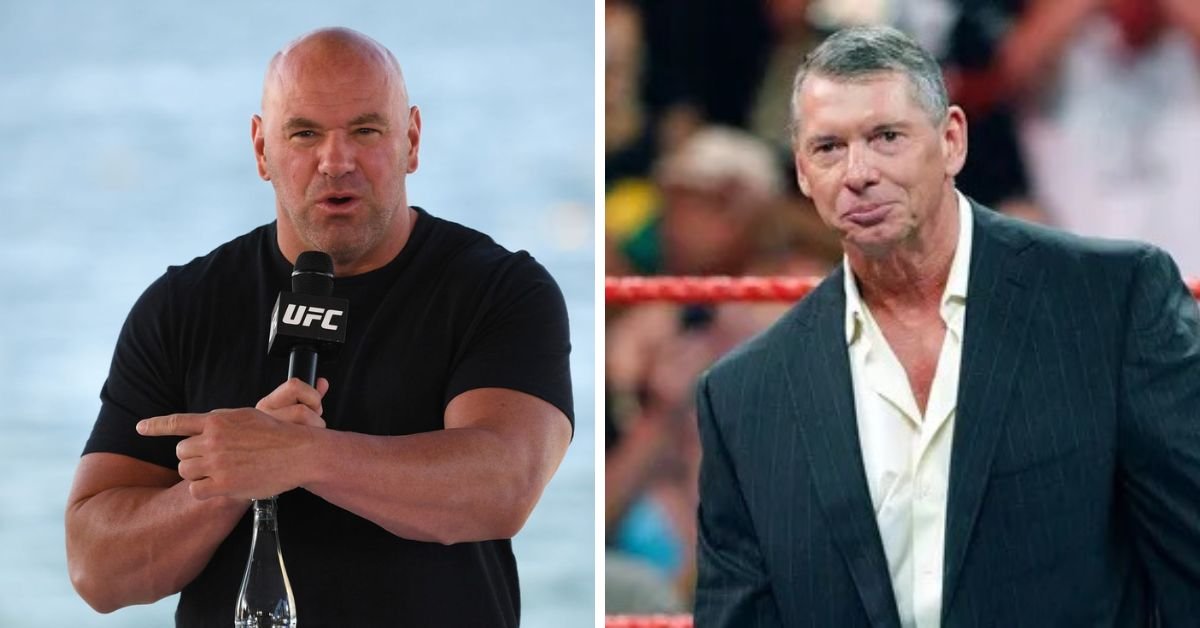In the complex world of combat sports broadcasting, few incidents stand out as prominently as Vince McMahon’s influence over UFC’s failed negotiations with NBC. Dana White’s recounting of events from 2011 reveals how the head of WWE used his power to thwart a major breakthrough for the UFC. Specifically, McMahon utilized his contractual rights to block any form of combat sport from airing on the USA Network if it posed a potential competitive threat. This unilateral control not only sank the UFC’s NBC deal, which was expected to elevate the brand’s visibility, but it also showcased the competitive nature inherent to the world of wrestling and MMA.
The repercussions of McMahon’s actions went beyond a single negotiation. Following the abrupt collapse of the NBC deal, the UFC was compelled to seek alternatives, which ultimately led to their alliance with FOX. This particular partnership proved to be quite fruitful, illustrating both the serendipitous nature of timing in broadcast rights and the importance of strategic relationships in the realm of sports. White’s reflections underscore how McMahon’s refusal to accommodate UFC’s presence on USA Network culminated in a reshaping of the combat sports broadcasting landscape.
Impact of Vince McMahon’s Decision on UFC’s Trajectory
The ramifications of McMahon’s decision to sabotage the NBC deal were profound, shaping the UFC’s future in unexpected ways. Initially, the organization considered purchasing G4, a network that was poised to enhance its programming presence. However, with McMahon’s interference halting the NBC partnership, the UFC’s plans to buy G4 also fell through. The UFC ultimately gravitated toward a deal with FOX, paving the way for extensive growth in viewership and revenue, as well as enhanced media presence.
Fast forward to today, the UFC remains one of the leading entities in combat sports, with ongoing negotiations for lucrative broadcast rights agreements. The lessons learned from this pivotal moment served as a blueprint for navigating partnerships and understanding the competitive landscape of sports entertainment. Dana White’s perspective suggests that, ironically, the friction created by McMahon’s actions contributed to a strategic resilience within the UFC, enabling it to adapt and thrive amidst challenges emanating from rival promotions.
Dana White’s Perspective on Rivalry and Business Dynamics
Dana White offers a unique insight into the dynamics of rivalry within combat sports, particularly how the competitive nature between organizations can spur innovation and growth. His assertion that Vince McMahon viewed the UFC as a rival rather than potential ally highlights a critical aspect of business in sports: the fine line between competition and collaboration. White’s experiences navigating these waters underline the notion that rivalries can fuel development, leading to superior product offerings and diversified platforms for athletes.
Moreover, White’s commentary gives context to the broader landscape of combat sports broadcasting. With UFC’s eventual partnership with FOX and later ESPN, it became evident that the failure of the NBC deal was a turning point that forced the organization to reassess its strategies. These ongoing negotiations for a new deal, estimated to be around 1 billion dollars annually, illustrate the UFC’s commitment to growth and adaptability in a sector often influenced by major personalities and shifts in media consumption practices.
The Ultimate Fighter and its Broadcasting Evolution
The placement of ‘The Ultimate Fighter‘ on the USA Network was a strategic cornerstone of the UFC’s broadcasting strategy. White’s insistence on this arrangement during negotiations with NBC was rooted in the belief that this reality series could significantly elevate the sport’s profile among mainstream audiences. However, McMahon’s ability to veto such placements speaks volumes about the control dynamics within sports broadcasting and illustrates how specific programming decisions can either make or break fledgling sports leagues.
As UFC continues to evolve, the legacy of ‘The Ultimate Fighter‘ serves as a reminder of the impact that foundational programming can have on an organization’s trajectory. It not only showcased emerging talents but also set the stage for future broadcasting collaborations that would lead to increased visibility and new audiences for the UFC. Understanding these historical contexts enhances the appreciation for the present-day broadcasting landscape, where networks are vying for rights amidst an explosion of interest in combat sports.
Long-term Effects of UFC’s Partnership with FOX
The partnership between UFC and FOX is illustrative of how strategic alliances can significantly enhance a brand’s market presence. This deal not only offered a robust platform for UFC events but also provided a means for the organization to reach broader demographics across multiple channels. White’s remark about the importance of securing media deals underscores the strategic foresight that characterized the UFC’s shift post-NBC negotiations.
However, the benefits of the FOX deal extended beyond mere broadcast rights; it reshaped the Promotional landscape for combat sports, placing the UFC as a key player in American sports culture. The growth of UFC during this era illustrates how well-timed negotiations and risk management are crucial for sustained success, especially in a competitive environment filled with established players like WWE.
WWE’s Position in Combat Sports Broadcasting
WWE’s strategic positioning within the realm of combat sports extends beyond mere entertainment; it captures a significant share of the sports audience through established programming and marketing prowess. Vince McMahon’s stronghold on broadcasting platforms, particularly USA Network, illustrated how pivotal television relationships can dictate the opportunities available to rival promotions like the UFC. The exclusivity of broadcasting rights has long been a hallmark feature of sports contracts, shaping not only the growth of franchises but also influencing viewer engagement.
As the wrestling landscape continues to evolve, WWE’s ability to leverage its extensive history and loyal following remains a competitive advantage. The ongoing broadcasts of shows like Monday Night Raw not only maintain but expand its influence, demonstrating the power dynamics at play within combat sports. In light of McMahon’s actions against the UFC, it becomes clear that the broadcasting choices made by wrestling promotions set the tone for the larger combat sports arena.
Negotiating the Future: UFC’s Road Ahead
As UFC enters a new phase of negotiation for broadcasting rights, the lessons from past dealings remain crucial. The organization’s aim for a billion-dollar annual deal signifies its growth and ongoing appeal within the sports market. Learning from previous experiences with high-stakes negotiations, the UFC is now better equipped to navigate potential obstacles and conflicting interests that arise, particularly with rival promotions like WWE still active in the landscape.
Furthermore, this ongoing evolution highlights the adaptive nature of the UFC in response to competitive pressures and changing audience preferences. By emphasizing innovation and securing strategic partnerships, the UFC is positioning itself for sustained success in broadcasting amidst an ever-dynamic combat sports environment.
The Legacy of Vince McMahon: Rivalry in Sports
The legacy Vince McMahon leaves behind in the world of sports is one marked by rivalry, ambition, and a relentless drive for control. His decision to sabotage UFC’s NBC deal reveals the lengths to which he was willing to go to safeguard his brand and its market share. By evaluating this rivalry, one can see how such dynamics shape overall industry trends, potentially dictating the fortunes of not just the companies involved but the broader sports landscape as well.
Ultimately, the effects of McMahon’s actions ripple through the industry, reminding stakeholders of the intricate balance between competition and collaboration. As UFC navigates its next steps, the lessons learned from its encounters with McMahon and WWE will inform future strategies, emphasizing the significance of strategic partnerships and the management of market perceptions in combat sports.
Lessons Learned from UFC’s NBC Negotiation Saga
The saga surrounding UFC’s NBC negotiations serves as a case study on the intricacies of sports broadcasting and the pivotal role individual stakeholders can play in shaping outcomes. Dana White’s determination and refusal to be deterred by Vince McMahon’s interference reflect the importance of resilience and adaptability in the face of challenges. The UFC’s journey into new broadcasting agreements exemplifies the necessity for organizations to learn from setbacks while simultaneously identifying opportunities for growth.
These lessons underscore a broader message about the landscape of combat sports: that rivalries can often spur innovation and lead to significant developments within the industry. UFC’s trajectory after the negotiations with NBC highlights how observing past encounters can influence current and future strategies, contributing to the sport’s evolution.
| Key Point | Details |
|---|---|
| Background of Negotiation | In 2011, UFC was seeking to negotiate a new broadcast deal after leaving Spike TV, with NBC offering the best deal. |
| Vince McMahon’s Role | McMahon had rights to block other combat sports, which he exercised to prevent UFC from airing The Ultimate Fighter on USA Network. |
| Meeting with Vince McMahon | Dana White and Lorenzo Fertitta met with McMahon in an attempt to resolve the issue, but McMahon refused to allow UFC on the network. |
| Fallout from the Negotiation | The failed deal led UFC to partner with FOX, which ended up being a successful long-term contract. |
| Impact of the Cancellation | The cancellation of the NBC deal led UFC to avoid purchasing G4, which later shut down. |
| Current Situation | UFC is now negotiating a new deal worth approximately $1 billion annually. |
Summary
Vince McMahon sabotaged the UFC-NBC deal in 2011, impacting the organization’s broadcasting future. During the negotiations, Dana White and Lorenzo Fertitta faced unexpected resistance when McMahon exercised his right to block UFC from airing on USA Network, despite NBC having a favorable offer. This resulted in UFC securing a deal with FOX instead, which turned out to be beneficial. This incident underscores the competitive nature of combat sports, with McMahon viewing UFC as a rival rather than a partner. Ultimately, the ripple effects of this missed opportunity continue to shape UFC’s broadcast strategy as they move forward with new negotiations.







